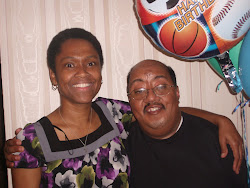Why is it that I do so much for others? I ask myself this question quite often, especially when it seems that I barely have time to do the things I need to do for me when I allow myself to put others’ needs before my own. I think it all has to do with one’s perspective. This is something I gained from the training weekend I just completed.
One of the presenters, a young man by the name of Scott, recounted his friend’s reaction when Scott told the friend that he and his wife were expecting their first child. Scott says he was in his early 20’s (as was his friend I’m guessing), and the friend’s reaction was a concerned, “Dude!” Scott was so excited, he couldn’t understand his friend’s glum and less than enthusiastic response to news of the pregnancy. “What’s with that? Aren’t you going to buy me a beer or something to celebrate?!” Scott asked. The friend explained (and I paraphrase), “You and your wife had plenty of time together, your money was ‘right,’ you could travel or hang out with friends when you wanted. A baby will change all of that. You won’t have any alone time. You’ll have to get a babysitter to go out. All of your money will go for baby stuff, etc…” Then, Scott’s response was, “Dude!” He apparently hadn’t thought of all of that. After giving it some thought Scott concluded that having a baby would bring him and his wife closer together from a “babies-are-a-gift-from-God-and-a-source-of-grace-which-draws-Christians-closer-together” kind of perspective (again, that’s me paraphrasing what I recall Scott saying). So, it’s all in the way you look at it or your perspective on a matter.
Now, back to my perspective on helping others…Every time I do something for someone else, deep down inside I see it as an act of love. Sometimes I fuss about it, and that’s not so cool. I must get better about that part. For the most part, I feel blessed when I help others because I remember to pray for them when they have a need that I can fulfill. The trick is determining when my “helping” others is actually detrimental to them in an unhealthy, codependent “enabling” sort of way.
Let’s take my kids, for example. As a “stay at home” mom* when they were younger, I felt it was my “job” to do for them: keep ‘em bathed and fed and exposed to “the arts” and opportunities for physical activity. I also felt like it was my “duty” if you will to take care of Mike in much the same way. After all, he was missing out on lots of stuff in A & A’s lives because he was the main breadwinner and had to work lots of hours (especially after all of the madness that followed 9/11/01). The trick is gradually “weaning” them from this mentality that “everything is Mom’s job” (meaning every chore around the house-both inside and out) and cultivating independence and responsibility. Any parent knows that’s often easier said than done. To this day, I continue to do things for them (things I know they should do for themselves) for many reasons:
Superwoman syndrome: my way is the right way and if you want something done right you do it yourself.
They allow me to (i.e., they’d rather not do it themselves)
Choose your battles: in the time it takes me to argue about whose turn it is to do a certain task or who did it last time, etc. I could have already had it done (the way I want it done, too, mind you).
It’s the principle of the thing: Why call someone from way in the back of the house to put away the milk when I’m standing less than 3 feet from the refrigerator?
*I put “stay at home” mom in quotes earlier because ever since I quit working outside of the home full time (after Alisa’s birth), I have done some type of work to supplement Mike’s income: medical transcription, caring for my nephew & niece, working at Parent’s Day Out, etc. Again, this is my way of showing love.
Maybe this entire line of reasoning is nothing more than an attempt to justify or rationalize my actions so I don’t come off looking like a spineless wuss, but really, my point is this: If I look at my doing things for others as “acts of love” vs. “chores” then I keep my sanity to a certain degree. If I dwell on everything I do for others and cry, “Woe is me!” while hypothetically “playing sad music on my violin” for doing it then I feel abused, depressed and/or angry. It’s all in the way I choose to look at it.
Another of the presenters, Patty, spoke of the importance of the hospitality committee, and the role they play in the RCIA program. Evidently, in her parish she can call on members of the hospitality committee to prepare fresh-baked cookies, breads, etc. for the candidates going through the program. Patty said she or anyone else could stop by Kroger and pick up packages of cookies, but the act of baking home-made goodies embodies the concept of giving of oneself and one’s time as an act of love. If you think of Maslow’s hierarchy of needs, you’ll remember that basic needs (food, water, clothing & shelter) must be met before advancing to safety/security and self-esteem needs. Feeding people physically is just as important as feeding them spiritually, especially when the meetings are held in the evenings, and many attendees come straight from work and my not have had a chance to eat. This dialogue is meant to show a connection between my hospitality toward others and the hospitality ministry at one’s parish.
This reminds me of the book Like Water for Chocolate by Laura Esquivel. The main character Tita is the youngest daughter of a family from Old Mexico; therefore she must prepare meals, care for her aging mother and never marry. Naturally, she falls in love, but her beloved marries her older sister so he can be close to Tita without breaking with “tradition.” Tita is crying as she bakes her sister’s wedding cake, and when the guests consume the cake they all begin to cry as well. Imagine if someone was praying all the while they were baking for the RCIA program! Think of the little elderly, widowed parishioner whose kids are grown and long gone to live their lives. She who may or may not get out very much anymore. Her contribution of baked goods validates her existence and fills a need for others as well. Maybe she can’t sing in the choir or visit the sick and shut-in, but she can bake some scrumptious cookies. It really brings to life the phrase: “homemade with love.”
I think the bottom line of this "post" is: I am a better person for helping others, and I hope those whom I help are better people for having been helped. Maybe they will "pay it forward" somewhere down the road.
Just a little note about the terminology. RCIA stands for Rites of Christian Initiation of Adults. It is a program for people who wish to become Catholic to learn more about the Catholic faith and doctrine. Sometimes “cradle Catholics” (i.e., people who were baptized as infants and raised in the Catholic church) take the course as well to better understand their religion. A “catechumen” is the person going through the initiation or conversion. The “catechist” is the teacher or leader of the RCIA training. To put it all together, the training I attended over the weekend was entitled: Fort Worth Diocese RCIA Catechist Training Seminar. The seminar was presented by representatives of the Association of Catechetical Ministries (ACM) who introduced us (current and future catechists) to excellent resources for our parish RCIA programs. That's enough of all that! Good night. Until next time...
Tuesday, August 4, 2009
Subscribe to:
Post Comments (Atom)











great entry e, i really liked reading that!
ReplyDelete